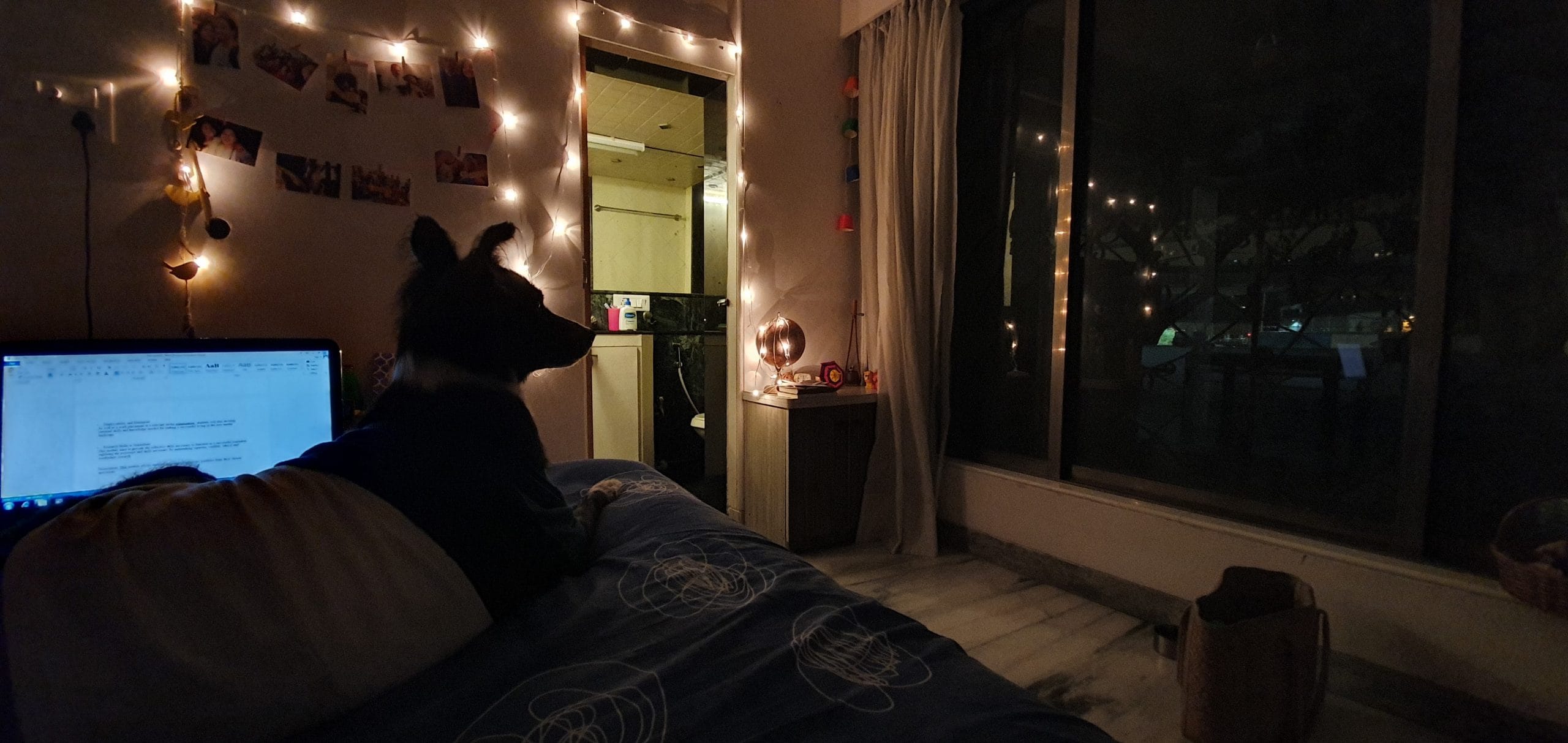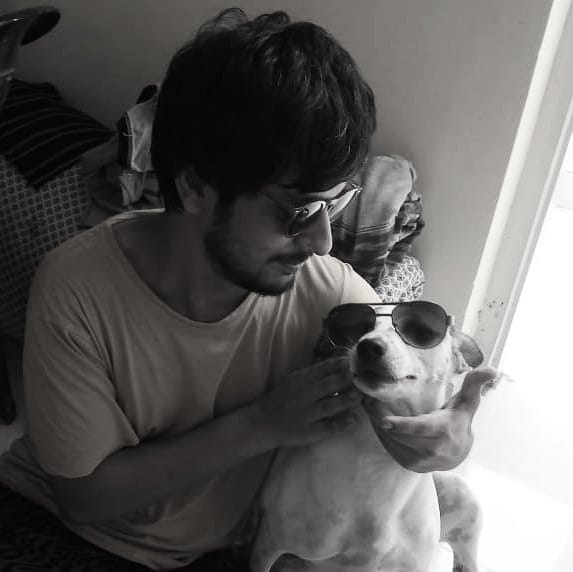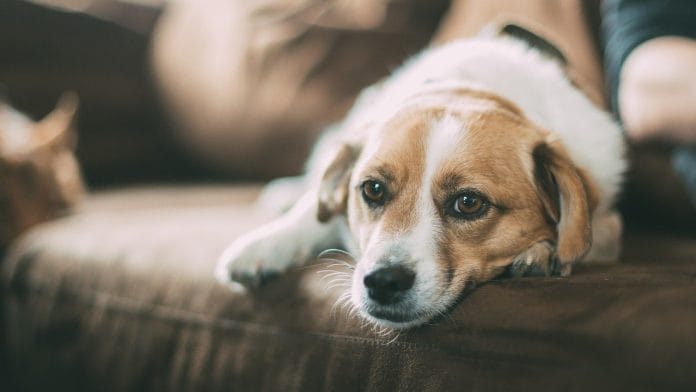If Lipstick Gupta could speak, she’d tell you she’s the happiest dog in the world right now. An eight-year-old rescue dog in Mumbai, she’s embracing the lockdown with her paws wide open. After all, her owners (or, as many pet owners prefer to be called, parents), who were earlier out the entire day, now spend all their time at home.
“Lipstick is either sleeping or playing with us these days,” her parent, Oindrilla Gupta, tells ThePrint. “Her mental health has visibly improved,” adds the freelance travel writer.
In the pre-Covid world, Lipstick would spend at least six hours every day in the sole company of Gupta’s cat, Mogambo, as the family went off to work.

Jackie, a 13-year-old golden labrador, is another one who is loving the lockdown. He enjoys the silent walks he takes in his Mumbai building complex without kids annoying him all the time now. He’s much happier meeting his old dog pals, walking a little, sitting in silence and coming back home.
“Jackie loves kids, but he’s a senior now and doesn’t have patience for children fussing over him anymore,” says Sayali Korde, a psychology student.
Even as humans struggle to cope with the lockdown, dogs seem to have taken to it rather well.
Dog trainer and behaviourist Tanya Patel tells ThePrint she’s had very few complaints from her clients during this time, and she believes people can use the enforced home time to get to know their pets better — “train your dog, play with them, understand what kind of food they like, among other things”.
It’s also a time to ensure they are kept mentally engaged.
Also read: Good dogs don’t make good co-workers
Shorter walks, but there’s plenty to do
Not all pet dogs are getting to go for walks as usual like Jackie.
For Divine, a four-year-old spitz in Mumbai, walks used to be the best time of the day, but the lockdown has changed that. “Our building society has shut all the gates and we can step out on and only if we want to get essentials,” says Anuradha Nagar, a student at Sophia. “He looks at the gate extremely longingly every time we step out for a short walk.”
These days, Divine sits solemnly by the window. Anuradha tries her best to play with him and keep him distracted so he doesn’t get irritated, and never leaves his side.
Patel thinks it is important to keep pet dogs engaged — offer them chew toys, throw them a bone, play a little fetch — so that there’s a certain level of activity maintained.
If you have a big dog, or slippery tiles at home in which case playing fetch isn’t a great idea, one can always indulge in games that require application of mind like treasure hunts. These activities also help in improving the dog’s sniffing abilities.
But what Patel doesn’t advise is staying by your pet all day long. “They’ll form an unhealthy bond with you and once you go back to normal life, it will be difficult for them to cope with it,” she explains. She advises pet parents to practise social distance with their dogs too —leave them alone in a room for a while, avoid feeding them with one’s hands all the time, not let them get used to a lifestyle that won’t continue once lockdown ends.
Also read: This online quiz contest by Bengaluru group is engaging families across the world every Sunday
Keep your eye on the post-lockdown ball
While the bonding between dogs and their parents has strengthened, and most of them are elated to have their best friends home, separation might be just as difficult to handle. Yudhajit Mukherjee who is alone in lockdown in Delhi with his five-year-old rescue dog, Pepe, fears it might get ugly. “When she first came here, she had major separation anxiety. She’d cry all day when I wasn’t there… I don’t want that to happen again,” the advertising professional tells ThePrint.
But Mukherjee is doing a lot of things to ensure Pepe’s life doesn’t change drastically once the lockdown ends. He has ensured her schedule is just like it was pre-lockdown. “Long walk in the morning, another one in the evening; food exactly when she used to get it pre-lockdown,” Mukherjee says, all of the practices get a nod from Patel, who emphasises that one stick to the routine the dog is used to.

Younger dogs will be the most affected by a prolonged lockdown, and once it ends, too, according to Patel. It’s all the more important to train them, develop social skills and inculcate good habits in them.
“Dogs know what pre-lockdown life was like, but for puppies, this is what it’s like all the time, they know nothing else. They’re used to a quiet world, post lockdown, even sounds of traffic might irritate them or they might not be people-friendly because they haven’t seen anyone outside the family.”
Jaipur-based Hemant Khatri who rescued a very young, abandoned Jimmy, is extremely attached to him now. “The dog follows me everywhere I go,” he says. Patel says this is precisely what one must avoid. Pups have a tendency to follow you into the bathroom as well, she says, and this habit needs to be broken early, and the formation of an unhealthy attachment avoided.
Khatri dreads the inevitable separation of being around Jimmy 24×7 once the lockdown ends, but adds, “We don’t know when that will be.”
Also read: Indians in lockdown find new passion in baking bread, and it’s helping them beat the blues







Exemplary treatment meted to dogs by their dedicated parents. Sabazs